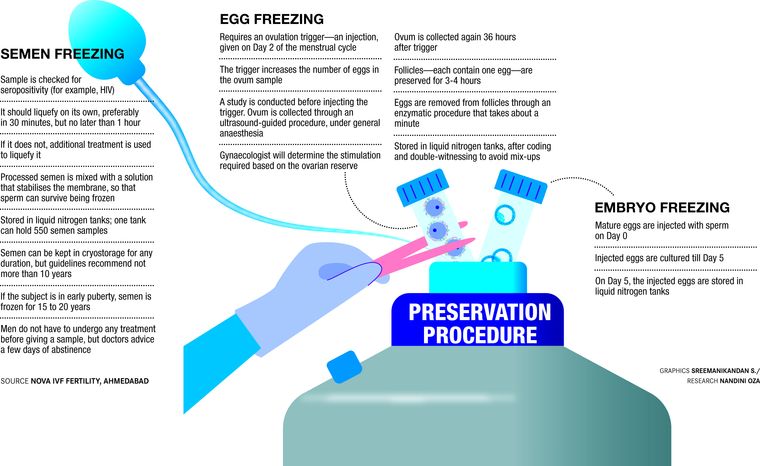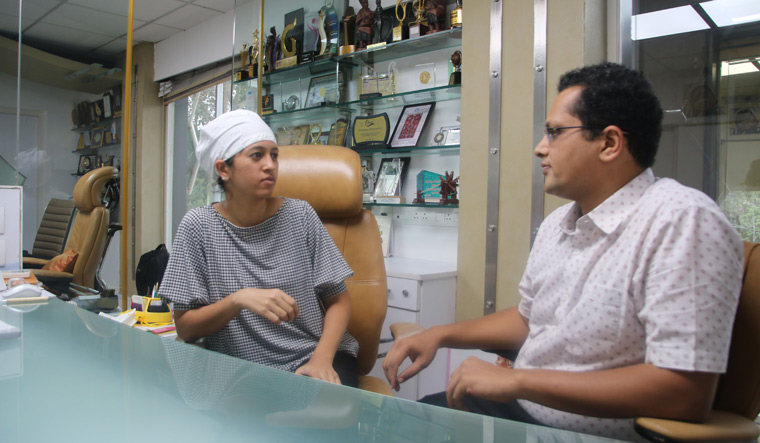Early this year, Covid-19 infections peaked in Gujarat, causing hundreds of deaths. Amid headlines about the shortage of ventilators, oxygen cylinders and hospital beds, one story stood out—a 29-year-old Vadodara woman’s plea in the Gujarat High Court to allow her to bank her husband’s sperm. He was critically ill with Covid-19. Her lawyer, Nilay Patel, told THE WEEK that the petition was filed as it was her right to have a child from her husband. The court granted permission, and doctors managed to collect and bank the sperm just hours before his death.
Around the same time, a similar story surfaced. Hely Aerke, 36, wanted a child from her late husband. The Vadodara-based accountant and Sanjay were married in 2014. The couple had opted for in-vitro fertilisation (IVF) and the frozen embryos were kept at Dr Nayana Patel’s Akanksha Hospital and Research Institute in Anand. Covid-19 hit the couple with a double whammy—it delayed the IVF procedure and, sadly, claimed Sanjay on April 23.
After Sanjay’s death, Aerke tried IVF, but failed to get pregnant. Now she is considering surrogacy. “It is an ultimate feeling when a child calls you mother,” she said, overcome by emotions. She added that she was capable of raising the child as a single mother.
Stories of these women from Vadodara might sound unique. However, cryopreservation (the process of cooling and storing cells to maintain their viability) of sperm, eggs or embryos to have a biological child is nothing new in Gujarat. The city of Anand is called India’s surrogacy capital. According to Patel, many married men from the region—who are mostly employed away from home—bank their sperm. Several women, who wish to conceive at a later age, freeze their eggs.
Patel said that now, due to increased awareness and societal acceptance, even unmarried men and women are coming forward to have their sperm and eggs stored.
Dr Manish Banker of Nova IVF Fertility in Ahmedabad said that every month, at least four to five patients—in the 18-45 age group—come to his clinic for cryopreservation of their sperm. “Normally, these are men whose sperm quality is expected to deteriorate due to medical conditions like cancer,” he said.
Jigar Khatri, 23, an Indian student in the United States, was diagnosed with colon cancer early this year. In April, he froze 10 sperm samples. “I had to undergo chemotherapy and radiation. I was told that it may affect sperm count,” he said. “I was taking it one step at a time with the final aim of getting cancer-free. Freezing sperm for future use did not even cross my mind then. Nevertheless, I followed what my oncologist suggested.”
Dr Dinesh Suthar from Saurashtra had a condition called peripheral neuropathy, induced by vitamin B12 deficiency; a condition that could affect sperm quality. Unmarried and just 25 years old, he banked his sperm to be safe. “I was worried about my life post-marriage,” he said. “I was advised by a friend, and then I went ahead with the procedure following a discussion with my brother who is a physician.”
Dr Himanshu Bavishi, founder of the Bavishi Fertility Institute (BFI) chain, told THE WEEK that the youngest person banking with BFI is a 16-year-old boy. “If the person has a partner, it is preferred to preserve the embryo, or else eggs and/or sperm can be kept frozen,” he said.
Bavishi cited a case in which sperm stored for 12 years was used successfully. The female partner had a problem, and the couple was not sure about opting for surrogacy initially, he said. Later they changed their mind and used frozen sperm. Their child is five years old now.
Bavishi points out that society’s acceptance was crucial for the popularisation of reproductive technology using frozen embryos, sperm or eggs. “Earlier, people used to murmur when wives of military men, seafarers or those living abroad used to get pregnant in the absence of their husbands. But that is not the case now,” he said.
Freezing and storing semen is a simple process that costs around Rs2,000 to Rs5,000 per year. Compared with that, cryopreservation of eggs is complex and expensive. The cost of extracting and freezing eggs is almost equivalent to the cost of one IVF cycle, which comes to more than Rs1.25 lakh.
“In Gujarat, you get donors easily and there are no inhibitions,” said Patel. “Necessary tests are undertaken before getting the samples.” At Indian Spermtech, a sperm bank in Ahmedabad, professional donors get anywhere between Rs500 to Rs2,000 depending upon their background and the quality of sperm. Ashok Patel, who founded Spermtech in 2000, said that the bank collects around 500 semen samples monthly. According to him, 90 per cent of the donors are professional donors, and they come from the age group of 21 to 35.
Before using the sperm from professional donors, doctors and the recipients check several factors, including education, height, social and economic background, hair colour and eye colour. According to Dr Janki Bavishi, co-director of BFI, professional egg donors can get anything up to Rs1.25 lakh per egg, depending on the background.
However, unlike men, who can give sperm a couple of times in a month, there is more screening for women. The procedure is also long. As per the American Society for Reproductive Medicine guidelines, an egg donor is allowed to donate only six eggs in her lifetime.
BFI takes eggs only from donors who have already given birth to a healthy child in the past. This, Janki said, gives an added assurance about the egg’s quality.
Dr Parth Bavishi, son of Dr Himanshu Bavishi and co-director of BFI, said: “By word of mouth publicity, technological advancement and increased expertise, more and more people are opting for semen freezing. Oncologists are also more proactive.”
Dr Mansi Shah, oncologist at HCG Cancer Centre in Ahmedabad, said doctors have to brief patients about possible fertility issues that can arise due to chemotherapy. These are usually conveyed to them in the first or second counselling, she said.
Shah added that while advancements in medical technology provided a better quality of life for cancer patients, fertility options gave them hope.
Some names have been changed




